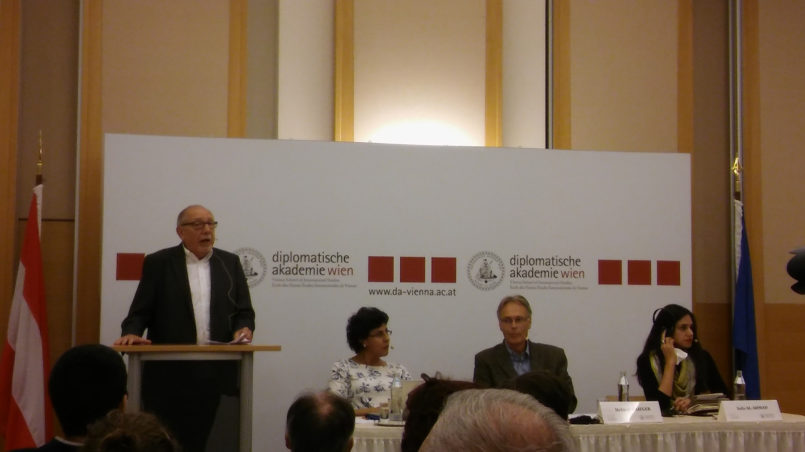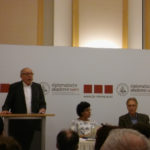Yemen – Crisis, Revolt, War

Event data
- Datum
- 13. 10. 2016
- Host
- Diplomatische Akademie Wien
- Location
- Diplomatische Akademie, 1010 Wien, Favoritenstraße 15A
- Event-type
- Podiumsdiskussion
- Participants
- Elham Manea, Assoziierte Professorin am Institut für Politikwissenschaft, Universität Zürich
- Safa Al-Ahmad, Journalistin und Filmemacherin, Saudi-Arabien
- Helmut Krieger, Institut für Internationale Entwicklung, Universität Wien
Due to the fact that the event was the kick-off of the Salam Orient Festival, a surprisingly high number of people attended the event at the Diplomatic Academy. On a topic which, in comparison to Syria, appears only rarely in European media.
The founder of the One Nation party described the chaos and the hopeless situation in which, above all, civilians find themselves. The only hope that he sees for his country in the short term is the cessation of all deliveries of weapons and a (difficult to achieve) ceasefire.
Safa Al-Ahmad, a film maker who was born in Saudi Arabia, produced a documentary last year about the rise of the Houthis in northern Yemen, which is well worth seeing. In a longer presentation, she attempted to describe the highly complex situation in Yemen.
She considers as central two developments which led to the outbreak of civil war in 2011:
- The suppression of the Houthis in northern Yemen who belong to the old religious movement of the Shiite Zaydismus, by the Sunni central State: the government, under the autocrat Ali Abdullah Salih, waged six wars against the tribes around the city of Sa’dah between 2001 und 2011.The Houthis were, as a result, hardened by the wars and presented a well-equipped military which spread to the south in the conflicts of 2013/2014, took the capital Sanaa and even penetrated to Aden for a short time.
- In 2007 there were peaceful protests by students against the (in their eyes northern Yemeni) government in Sanaa which put these down with military aggression. According to Al-Ahmad, aggressive potential was also created here which led to the current civil war.
Time and again the filmmaker stressed how complex the situation is in the country: coalitions have already changed on numerous occasions. The old president, Salih, who waged war against the Houthis for over ten years, has now entered into an alliance with them. The new president Abed Rabbo Mansur Hadi on the other hand, has created a new coalition with the shifting of the capital to Aden and the delivery of weapons to the south.
Al-Qaeda‘s Yemini offshoot, the AQAP, has been able to establish itself in the south of the country. As a result of its investments in the infrastructure (electricity, sewers), the organisation has gained popularity with the local population. In contrast to the Islamic State, which hardly has fighters in Yemen and, when, it appears in the public due to bomb attacks, the AQAP is highly active and fights together with groups from the south.
Historical Digression
From 1962 to 1990 Yemen was divided into two states. The union in May 1990 was, above all, a result of the fall of the Soviet Union which the communist south had supported (the people were against the union). Civil wars and conflicts with the northern neighbour Saudi Arabia have characterised the history of the country since the 1960s.
President Abed Rabbo Mansur Hadi, who has been in office since 2012, leads a weak government. He had to flee from the Houthis to Aden and called on the assistance of the Saudis (who have been the world’s greatest weapon importer since 2013). He had the historical opportunity to bring about conciliation between the north and the south after the election.
Thr National Dialogue Conference, which was held in 2013/14 and was conceived as a transition process for a new Yemen, was, according to Elham Manea, merely a bubble because the strings were being pulled from the outside. The cessation of this dialogue also marked the beginning of armed conflicts. The proposed new constitution under President Hadi was aimed at distributing land and wealth more fairly.
According to Elham Manea, (here an article about her experiences as a youth with radical Islamism in Yemen…) the state was led for years by an ethnic elite who used international funds for their own purposes and not for the good of the state. This elite incited ethnic conflicts and exploited these in order to increase their power.
For example, President Salih supported the Houthis in the early years in order to wage war against them later. This tactic is well known and proven. In Yemen it is known as exclusions and grievances : groups are excluded from the state community in a variety of ways and the individual power is cemented by the war suffering of the people which leads to anger and further acts of violence.
Separation or Federation – What is the solution?
The basic precondition for any form of ceasefire is a cessation of the bombarding by Saudi Arabia and its allies. Further, it would be necessary, as was the case in 2013/2014, to have a national convention in which the various interests would have a voice in order to be able to placate the secession wishes of the south, possibly with an extensive federal structure.
A fact-finding mission of the UNO, as demanded in 2015, would be appropriate for this. For the two podium guest,s peace talks with the currently active personlaities would hardly be expedient.
In order to break up the many layers of this conflict, the flow of money will inevitably have to be followed. Because:
Money is more honest than politicians,
as Elham Manea correctly stated.
According to Al-Ahmad, the international community continues to make the same mistake: it supports the old elite. The hope of expecting another result if the same strategy is adopted was already defined by Albert Einstein as stupidity. Former President Salih embezzled up to 60 billion dollar – as a comparison: the gross domestic product of Yemen is 36 billion dollars per year.
The UNO, by means of a mandate from the Security Council, would currently be the only institution which could have a positive influence, A mission, however, could not be led by an Islamic state or by the western powers (USA, France, Great Britain).
According to Al-Ahmad, the USA is divided in its Yemeni policy: while the State Department and the Pentagon are against a too strong involvement in Yemen, the White House supports an active involvement in the Saudi coalition. Despite the obvious military strength of this coalition, to date no decisive victories could be won against the Houthis.
It remains to be seen what the position of the new American administration will be in this conflict.
Translation into English: Donna Stockenhuber
Credits
| Image | Title | Author | License |
|---|---|---|---|
 |
dipl-ak | Christian Janisch | CC BY-SA 4.0 |
